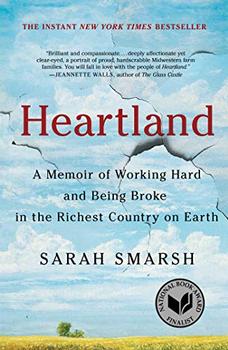Summary | Excerpt | Reading Guide | Reviews | Beyond the Book | Readalikes | Genres & Themes | Author Bio

A Memoir of Working Hard and Being Broke in the Richest Country on Earth
by Sarah Smarsh
That sort of alchemy, assigning a meaning—turning what some might view as the lowly act of foraging into a direct communion with God, for instance—is often the only sort of power a poor person has.
One thing Mom and I had in common was that we understood and respected the power of words and names. Her own mom said she had wanted to call her Jennifer, but Ray insisted they name the baby after Betty. That's how Betty later remembered it, anyway. So my mom was named Betty Jean and spent a lifetime explaining why she went by Jeannie.
My parents didn't know much about our lineage or even the meaning of our last name, but maybe Mom sensed it. She gave me a first name she knew meant "princess," as though someone who foraged to survive could still be regal or even rich in her own way. But it was my last name and its origins that decided the stuff of my life. Like poor immigrants not so far back in our bloodline, we were raised to not expect much and to ask for even less. It was a good thing, too. The house that Dad built wouldn't be ours for long.
* * *
I answered the question of whether I deserved to exist by working hard: folding laundry before I could read, reaching on my tiptoes to wipe off the bathroom counter while George Strait sang on the record player about rodeos and pretty women. I was raised to not be idle. Our hard work was how we had a roof and enough to eat.
What I did hunger for sharply, what my life lacked most sorely, was in my mother's heart—which had been scarred by the traumas of monetary poverty but carried a feeling of perpetual lack and discontent that knows no class.
The poverty I felt most, then, was a scarcity of the heart, a near-constant state of longing for the mother right in front of me yet out of reach. She withheld the immense love she had inside her like children of the Great Depression hoarded coins. Being her child, I had no choice but to be emotionally impoverished with her. I offered to rub her back every day so that I could touch her skin.
One develops a cunning to survive, whatever the shortage. My family excelled at creative improvisation: eating at Furr's Cafeteria on the rare food outing since it was all-you-can-eat and required no servers' tip; scanning garage sales for undervalued items that could be resold at higher prices; rigging our own broken things rather than calling an expensive repairman; racing to the grocery store to buy loads of potatoes at 5¢ per pound when the Wednesday newspaper ad had a typo that the company legally had to honor.
Similarly, I haunted hallways around the corner from where my mom sat reading Stephen King novels or watching soap operas as I tried to get up the courage to ask her if she loved me. It wasn't so much that I didn't know the answer as that I wanted to make her say it. Nothing was more painful to me than true things being denied.
When I asked, her answer had the right words but the same cruel tone as her silence. I wanted her affection, but more than anything, I wanted her to be happy. From what I've observed, a poor child's agony is just as often for her parents as it is for herself. You could say that is still a selfish impulse, because in order for a child to survive, her parents must survive, too. But I felt my family's burden as my own well past childhood.
* * *
You would have been born to creative, industrious people. That's what poverty requires.
Mom and Dad both were good at coming up with ways to make a fast dollar. During the summer of 1984, Dad got one of his more ambitious ideas when Sedgwick County banned the sale of high-powered fireworks—M-80s, bottle rockets, items known to blow people's hands off. Dad knew that Wichita people would have to go somewhere else to have some real fun on the Fourth of July.
Excerpted from Heartland by Sarah Smarsh. Copyright © 2018 by Sarah Smarsh. Excerpted by permission of Scribner. All rights reserved. No part of this excerpt may be reproduced or reprinted without permission in writing from the publisher.
Your guide toexceptional books
BookBrowse seeks out and recommends the best in contemporary fiction and nonfiction—books that not only engage and entertain but also deepen our understanding of ourselves and the world around us.